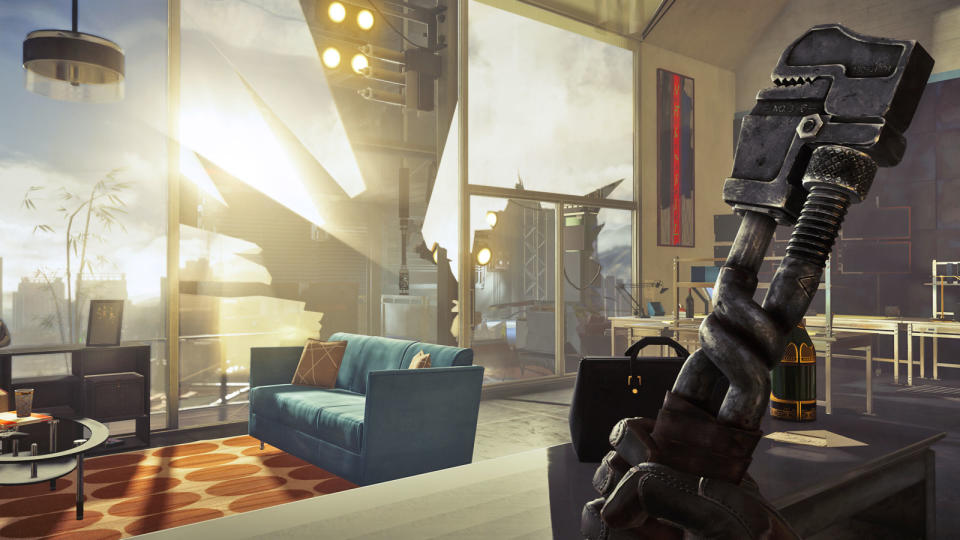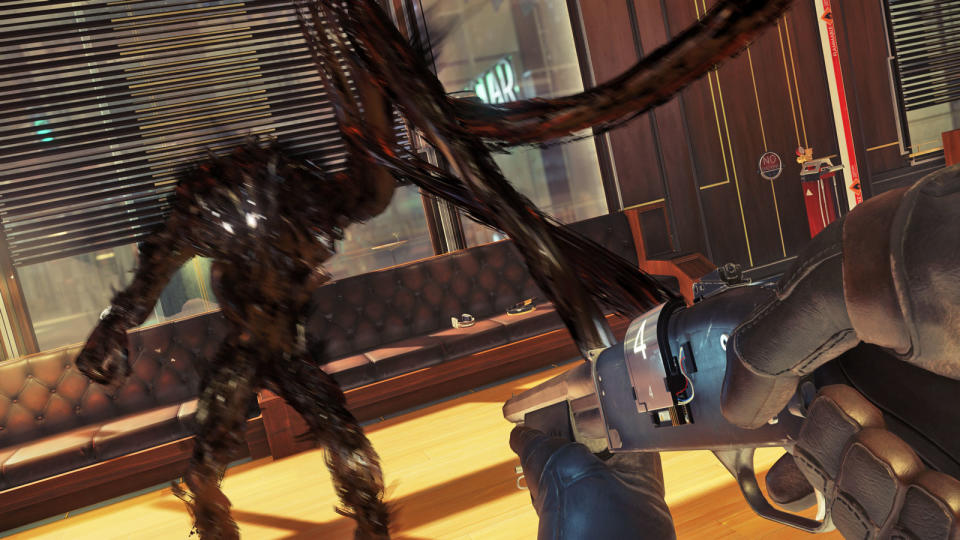Bethesda's 'Prey' reboot makes you fear everything
Arkane's latest game is a bit of a liar (but in a good way).

Prey is all about deception. The first-person shooter starts off simple enough: You're a scientist beginning a new job at your brother's massive research company. You wake up in your bedroom, do some exploring and board a helicopter on top of your roof to head to work, where you're then subjected to some first-day testing. Everything seems to be going fine, until -- much like Valve's 1998 classic Half-Life -- all hell breaks loose. Aliens run rampant in the compound, and you black out during an attack.
That's when Prey, the upcoming retelling of the 2006 game of the same name, twists the notion of what you know. You wake up in your bedroom again, just like before, as if the first 30 minutes of the game were a bad dream. But once you start exploring, you discover you're not in an apartment. You're in the middle of a giant sound stage simulating parts of your life, Truman Show-style. Once escaping the sound stage, you learn you're not in a futuristic version of San Francisco but instead on a space station that seems to be largely deserted. But one part of that earlier vision is true: The station is overrun with aliens.
Those aliens, too, are deceivers. They're not too imposing one-on-one; a few smacks with the wrench you carry is enough to dispatch them. But they're masters of surprise, because they can take on the form of everyday objects scattered around the space station, lying in wait for the right time to strike. At one point during the preview, I picked up a seemingly innocuous item and stored it in my inventory, only to have it start to strangle me. It was my first time playing through the game, and I didn't know what to do, so it killed me quickly. After that, I was a lot more careful about what items I picked up.

Even the game's name, Prey, is a bit deceptive. As Arkane has already admitted, the game has basically no common DNA with the original, outside the name. A sequel to the original Prey was announced all the way back in 2006, shortly after the original game's launch. But it lingered in development hell for years before publisher Bethesda picked it up in 2011.
A few years after that, news broke that the forthcoming game would be essentially a ground-up reboot, with all the previous work on what would have been Prey 2 tossed aside. Somewhat ironically, this might be one of the biggest things 2017's Prey has in common with the original: a long, protracted development cycle. When the original game came out for the Xbox 360 and Windows in 2006, it had been in development for over a decade.
There is, of course, one other big similarity as well. At a high level, the space/sci-fi/alien theme is all in line with the original, although that's a pretty broad template to play with. But Prey may have a lot more in common with Arkane's two Dishonored games than its namesake.
"No matter what kind of game we work on, there's two things we always try to do," said lead designer Ricardo Bare following last week's media preview. "One is we try to make the world as deeply and richly detailed as possible -- we treat the world and a setting as a character." I didn't totally get the sense that the world is a character from the brief demo I tried, but the world is vast and encourages exploration. The game's physics also encourage you to pick up and interact with as many things as you can find.
The second thing Bare cited as Arkane's goal was to "give the player a bunch of interesting tools, powers [and] gadgets and try to encourage them to improvise solutions to problems." That's another design goal that will need more gameplay time to come to fruition, as the first part of the game is fairly linear. But Bare and lead systems designer Seth Shain said the goal is to provide players with as many different ways to progress through the action as possible.
"We try not to ever make it so there's only one way to get into a place," Shain said. Both Shain and Bare explained that the the game's "soft gates" would have multiple solutions depending on your play style and that they would only force players into a "hard gate" where you have to have a certain skill or object to advance as ways to drive the campaign's story forward.

Similarly, encounters with the mimic aliens are entirely unscripted. "It's part of their AI behavior that they know when they go into a room, they're allowed to mimic any physics object that's of a certain size," Bare said. "Even as the developers, we are constantly surprised; we don't know what object is going to be a mimic."
That notion of giving players unusual objects and weapons was definitely on display in the Prey demo. The first weapon I got my hands on was a basic wrench for clobbering things, but then I picked up a gun that shot giant globs that stuck aliens in their tracks. A few wrench hits usually ended the threat. The fact that I went through the entire demo without ever shooting a bullet at a bad guy was unexpectedly refreshing for a first-person shooter.
At one point, you can even get your hands on a Nerf-style toy bolt gun -- and Shain confirmed that it's not only a joke but also something you can use to advance in the game. For example, at one point you'll find that some of the office's former inhabitants made capacitive tips for the darts, so you can shoot them at faraway computer screens to open doors.
It's too early to tell whether this will all add up to a full, compelling experience. But based on the demo, Prey appears to offer a few things that separate it from the average first-person shooter. You may be fighting creepy aliens, but the oddball weaponry and promised improvisational puzzle-solving should help it stand out.
That will hold true even more if Arkane can continue throwing twists at the players like I saw in the game's first hour. "We knew that we wanted to play on people's paranoia and fear, especially thematically with the intro that sets the player up to feel deceived," Shain said. "Then when the mimics make you feel like you can't even trust the environment around you -- that was a core piece of our design from the beginning." The key will be whether or not Prey, which launches for the Xbox One, Windows and PS4 on May 5th, can keep players feeling unbalanced for the entire game.
